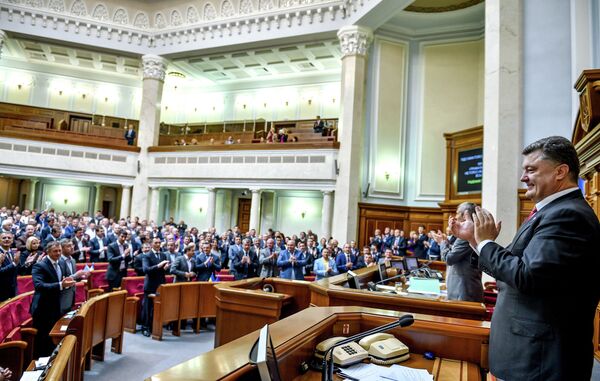LONDON, October 3 (RIA Novosti) – Ukraine's early parliamentary election scheduled for October 26 has little to do with democracy as it is just a public relations campaign launched by Kiev authorities, Marcus Papadopoulos, chief editor of British political magazine Politics First, told RIA Novosti Friday.
“The upcoming parliamentary election in Ukraine are not so much a show of democracy but rather a public relations effort by the Kiev authorities to demonstrate to the world that Ukraine is a democratic country and that its population is well and truly behind the electoral process there,” Papadopoulos said.
Ukraine is gripped by anarchy, while the opposition parties are being suppressed on daily basis, according to the chief editor.
“Ever since the western-back coup against the democratically elected president Viktor Yanukovych this February, Ukraine has descended into anarchy where violence against opposition parties is a daily occurrence - comparable to those Latin American countries in the latter half of the 20th century whose legitimate governments were overthrown in Washington-funded coups, such as Guatemala and Chile,” Papadopoulos stressed.
All major parties favoring close political and economic relations with Russia were subjected to persecution in Ukraine, he reminded.
“The Communist Party of Ukraine, which has traditionally supported close political and economic ties with Russia, has been banned from the Rada - the Ukrainian parliament - even though its representatives were democratically elected during Ukraine's last parliamentary elections. Furthermore, the leader of Ukraine's Communist party, Petro Symonenko, had his house burnt down by fascist mobs after the February putsch, with his family narrowly escaping the inferno. The pro-Western authorities in Kiev neither condemned that heinous act against Mr Symonenko nor apprehended the perpetrators of it. The Party of Regions, which also favors close political and economic relations with Russia, has been bullied into submission at the Rada. Its politicians have been physically assaulted in the parliament and have been portrayed on state-run television as ‘traitors’ and ‘servants to Moscow’,” the political analyst said.
The representatives of Ukraine's Russian-speaking community have also faced acts of intimidation for protesting "Russophobic" policies of the government of Petro Poroshenko, Papadopoulos underlined.
Other politicians who also hold different views with the government of Petro Poroshenko “Ukraine has rapidly become an intolerant and xenophobic country run by fascists and bigots who seek to eradicate any political party which has pro-Russian views. The country is now awash with neo-Nazi groups who patrol major Ukrainian cities - from Lvov to Kiev to Odessa - in order to intimidate any individual from the Russian-speaking community who might be inclined to protest at the Russophobic policies of the authorities in Kiev. And the violent nature of those groups cannot be underestimated, as their role in the horrific inferno incident in Odessa, this May, demonstrated,” the Politics First editor added.
With all this in mind, the position of the European Union and the United States seems to be rather cynical, said Papadopoulos.
“The European Union presents itself as a beacon of democracy and human rights but the reality is that it is very selective when applying these two concepts. In the EU member states of Estonia and Latvia, the Russian-speaking community there is treated as second class citizens, some of whom are denied citizenship while others are denied the vote in elections. Further to that, the Russian-speaking community in those two Baltic States has to endure annual Waffen-SS veteran parades. Brussels has never condemned the flagrant violation of the Russian-speaking community's human rights in Estonia and Latvia nor has Brussels condemned the grotesque Waffen-SS veteran parades in both countries,” the editor stressed.
“In Ukraine, the EU was complicit in the coup against the democratically elected Viktor Yanukovych and has failed to voice any concern at the treatment of the opposition parties in the country,” he added.
According to Papadopoulos, Ukraine has turned into “an official repository for racism towards Russians and Jews, praise towards those Ukrainians who collaborated with the Nazis during the Second World War and intolerance towards anyone who questions the policies of the Kiev authorities.”
“The United States and the EU will work with any group which will help in achieving its geo-strategic objectives - from the death squads of Latin America to neo-Nazis in Ukraine and the Baltic States to Islamists in Libya and Syria. In all those regions, Russia was or is perceived as the enemy by American and European officials and so steps were or have been taken by the West to support groups which are hostile towards Moscow, irrespective of how odious and dangerous the concerned groups are,” Papadopoulos concluded.


